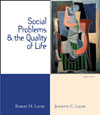 |  Social Problems and the Quality of Life, 8/e Robert H. Lauer,
U.S. International University
Jeanette C. Lauer,
U.S. International University
Poverty
Internet Exercises- The extent of poverty depends both on how one defines poverty and on how
one goes about measuring it. The U.S. Census Bureau Poverty Statistics Website
(http://www.census.gov/ftp/pub/hhes/www/poverty.html)
can help you consider this issue.
From the poverty home page, select "How the Census Bureau Measures Poverty";
then click on the link to "Poverty Thresholds" and compare data for
the years 1990 and 2000. Then, go back to the poverty home page and select "HHS
Poverty Guidelines." Under the section on "Poverty Measurement: Papers,
Articles, and a Report," select and read the articles by Gordon Fisher,
especially the one called "How Mollie Orshansky Developed the Poverty Thresholds." - What is the difference between the poverty threshold and the poverty guidelines?
- In your view, do the poverty thresholds provide an accurate picture of relative
poverty in the United States? Are they set too high, or too low? Why do you
think so?
- For a supplementary view on the causes of poverty, go to the Inequality.org
Website. (http://www.inequality.org/)
From the box on the right side of the homepage, select "The Press and
the Permanent Poor." This will give you access to an article entitled
"A Secret in the News: The Country's Permanent Poor," by Ben H.
Bagdikian. Although this article was written by the former dean of a graduate
school of journalism, it raises a number of sociological concerns.
- Critically evaluate Dr. Bagdikian's article.
- Do you think his argument is fair?
- Does it seem to you that the media may, indeed, help to justify a permanent
underclass in the world's richest nation?
|
|



 2002 McGraw-Hill Higher Education
2002 McGraw-Hill Higher Education